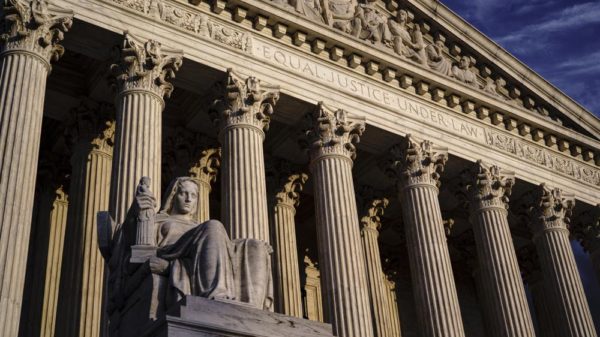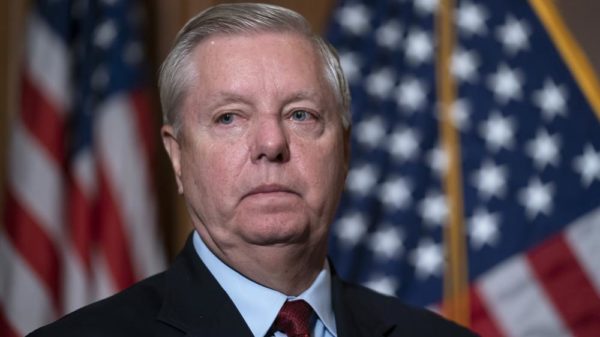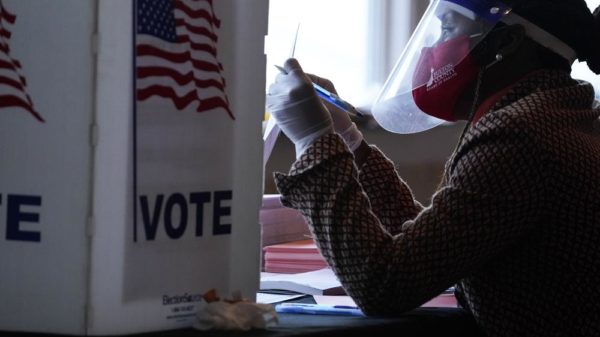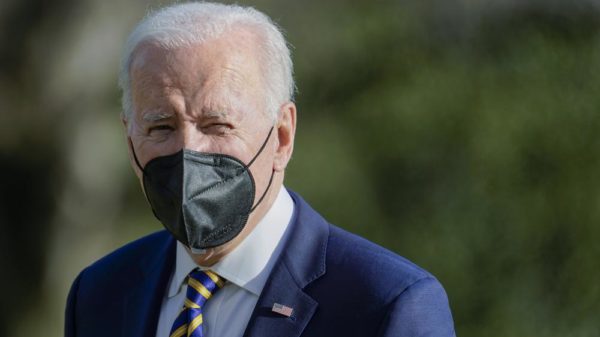WITH AMY CONEY BARRETT formally nominated for the Supreme Court to fill the vacancy left by the death of Justice Ruth Bader Ginsburg just last Friday, and Senate Republicans having enough support to push through her confirmation before Election Day, Democrats find themselves in a unfamiliar territory, with the Supreme Court potentially becoming the most motivating factor driving voters to the polls in November.
“The problem for Democrats historically and for the left historically is that at least since the Reagan era began in 1981 and the culture wars of this era began, the Supreme Court has never entered into the mix as much as it has for the right and for Republicans,” says Barbara Perry, professor of political science at University of Virginia.
“So it will be interesting to see if that holds this time when so much is at stake for the left and for the issues that they seemingly care about,” she says. “But the intensity of their views on the issues that the court decides and that they care about has just not driven them as hard and as intensely as the right.”
That’s poised to change, however, as Senate Majority Leader Mitch McConnell – armed with a 53-47 GOP majority in the Senate – has already pledged that lawmakers will consider Trump’s nominee, despite having blocked a nomination from then-President Barack Obama to replace Justice Antonin Scalia more than 200 days before the 2016 election.
“This has not traditionally been a motivating issue for Democrats compared to Republicans in the past, but I think a few things are conspiring to change this,” says Jim Kessler, executive vice president for policy and co-founder of the Third Way, a think-tank in Washington that attempts to help politicians find common ground on policy solutions. “No. 1 is it’s so obvious that Republicans have gone back on their word. Mitch McConnell just turned 53 senators into liars.”
“People have a low view of politicians keeping their word, but it’s rare that something so close to the election is such an obvious indication of how your word means zero,” Kessler continues. “I think this was a Republican miscalculation. Mitch McConnell doesn’t make a ton of mistakes, but I think this will go down as one of them.”
There are some early, concrete signs that Democratic voters agree.
For starters, Democratic donors gave $6.2 million in the 9 p.m. hour Friday after Ginsburg’s death was announced, The New York Times reported, more money than in any other single hour since ActBlue, the donation-processing site, was started 16 years ago. During the 10 p.m hour, they gave another $6.3 million – more than $100,000 per minute.
In total, more than $100 million in small-dollar donations have poured in since Ginsburg’s death, ActBlue reports.
A new poll from The Washington Post and ABC News, taken Monday to Wednesday, also backs up the narrative: 64% of Biden supporters say the vacancy makes it “more important” that he win the election, compared to just 37% of Trump supporters who say the same about Trump being reelected – a reversal from 2016, when exit polling showed that more Trump voters than Hillary Clinton voters said Supreme Court appointments were the most important factor in their vote.
A separate poll from Marquette Law School, conducted Sept. 8-15, just three days before Ginsburg’s death, shows Democrats were already slightly more motivated by the Supreme Court: Among likely voters who support Democratic presidential nominee Joe Biden, 59% say that the next court appointment is very important compared to 51% of likely voters who support Trump.
“The big take-away is the presumption that the court is especially powerful among the right doesn’t hold up here uniformly,” says Charles Franklin, director of the Marquette Law School Poll. “I think we mostly see a fairly even balance between the left and the right and some small but maybe interesting differences. But Democrats are a little more energized, or at least think the court seat is more important. When you look at ideology – liberals and conservatives – here the very conservative do have a little bit of an edge, but it starts to wash out when you think of the less strongly ideological.”
The poll found that among Democrats, 59% say the next court appointment is very important compared to 50% of Republicans and 41% among independents.
Meanwhile, among people who think of themselves as very conservative, 79% say the next court appointment is very important, compared to 70% of those who identify as very liberal. But among those who identify as conservative – not very conservative – only 45% say the next court appointment is very important compared to 65% of those who identify as liberal instead of very liberal.
“That’s a 20 point difference and the sample size is large enough that I’m reasonably confident that that’s not just pure noise,” Franklin says. “And it does suggest that motivation on the court is a little deeper on the left ideological groups than it is on the right.”
The evidence is less clear, however, that the big issues the court could hear and decide on in the coming years is motivating voters any more than in previous years.
For example, those with strong views of the 1973 Roe v. Wade decision, which made adortion legal, give only marginally more importance to the next appointment, the Marquette poll found. Of those who strongly favor overturning the decision, 59% say that the next Supreme Court appointment is very important, compared to 58% of those who strongly oppose overturning the decision.
Notably, the poll found a slightly larger divide when it asked about the Affordable Care Act. The Supreme Court will hear oral arguments this fall (just days after the election) in a case that challenges the law’s constitutionality and could result in the justices either upholding the law, striking down part of it or striking it down entirely. Among those who strongly favor striking down the health care law, 55% say that the next appointment is very important to them, compared to 63% who strongly oppose striking down the health care law.
“Democrats can very easily make this Supreme Court pick less about hypocrisy and more about health care,” Kessler says. “There are decisions making their way through the court as we speak that take fringe legal arguments that would conceivably strike the Affordable Care Act.”
“I think it’s very possible, and I expect Democrats will do this, that they will move beyond the hypocrisy charge for how this is bad for you,” Kessler continues. “And health care is Democrats’ strongest turf, even before COVID. Health care is what won in 2018 in the midterms. It’s a suburban issue as well, and this race will be decided in the suburbs. And so will a lot of the Senate races, by the way.”
Yet one issue could stand to motivate Democratic voters more than any other: The possibility of Trump contesting the results of the election and handing it to the Supreme Court to decide.
In recent days the president has refused to guarantee that he would accept the results of the election and vacate the White House if he is defeated, going so far as to say that he wants a successor to Ginsburg installed on the Supreme Court in time to adjudicate possible legal disputes over election results.
His remarks could serve to galvanize Democrats, who in turn swarm polling stations on Nov. 3 in order to beat the president by margins large enough that make it impossible for him to contest the result.
“I do think there’s a lot of ‘this changes everything in the election,’ and I’m less convinced of that, though we’ll see how it plays out,” Franklin says. “The Kavanaugh hearings were a good example where the right believed that the huge fight over him after [Christine Blasey] Ford came forward helped them – and maybe it did, I don’t have good direct evidence on whether it did or it didn’t.”
“But the mass public is actually not super engaged over the court,” he says. “So this is hugely motivating if you’re in the pro-life movement, but it’s hugely motivating if you’re in the pro-choice movement as well. The fraction of citizens who are genuinely engaged and motivated on these issues is not 90% of the citizenry. It’s a much smaller share.”










































